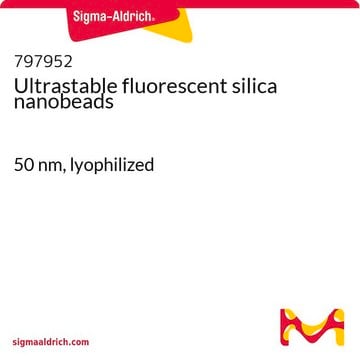791342
Silica, nanoparticle dispersion in water
<50 nm (DLS), triethoxylpropylaminosilane functionalized
Synonyme(s) :
NH2 functionalized NPs
About This Item
Produits recommandés
Niveau de qualité
Forme
dispersion
nanoparticles
Durée de conservation
1 yr
Concentration
in water (Dispersion)
Taille des particules
<50 nm (DLS)
Groupe fonctionnel
amine
Température de stockage
20-25°C
Vous recherchez des produits similaires ? Visite Guide de comparaison des produits
Description générale
Dispersion loading and medium (27 ± 3) wt.-% in water
Particle size d90 (volume distribution; DLS) < 50 nm
pH 2 ± 1
Density (1.2 ± 0.1) g/l
Primary particle size < 20 nm
Surface modification using Triethoxylpropylaminosilane
Application
Mention d'avertissement
Danger
Mentions de danger
Classification des risques
Eye Dam. 1 - Skin Corr. 1B - Skin Sens. 1
Code de la classe de stockage
8B - Non-combustible corrosive hazardous materials
Classe de danger pour l'eau (WGK)
WGK 2
Point d'éclair (°F)
Not applicable
Point d'éclair (°C)
Not applicable
Certificats d'analyse (COA)
Recherchez un Certificats d'analyse (COA) en saisissant le numéro de lot du produit. Les numéros de lot figurent sur l'étiquette du produit après les mots "Lot" ou "Batch".
Déjà en possession de ce produit ?
Retrouvez la documentation relative aux produits que vous avez récemment achetés dans la Bibliothèque de documents.
Les clients ont également consulté
Notre équipe de scientifiques dispose d'une expérience dans tous les secteurs de la recherche, notamment en sciences de la vie, science des matériaux, synthèse chimique, chromatographie, analyse et dans de nombreux autres domaines..
Contacter notre Service technique







